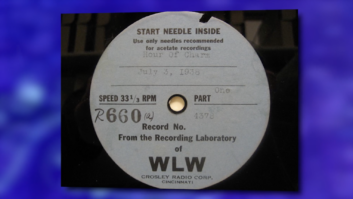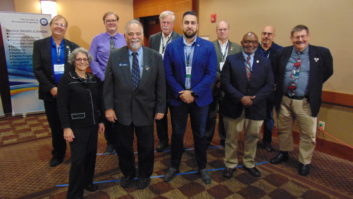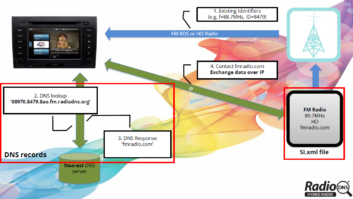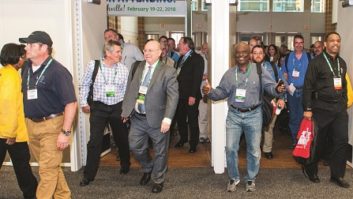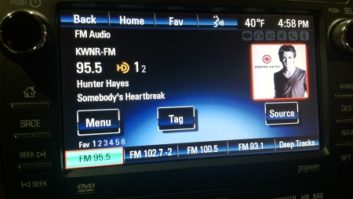CBS Audimax. Fairchild Conax. The Discriminate Audio Processor. Optimod 8000. The CP-803. Audio Prisms. The Aural Exciter. The Vigilante.
If that list gets you lightheaded, book a flight to the fall AES show in San Francisco.
David Bialik is determined to make the broadcast content at the U.S. AES the best track of broadcast panels offered anywhere — in fact he pretty much feels it already is. I’m not ready to grant AES that national title just yet; but it’s certainly a contender, and Bialik is the reason. He’s like a one-man convention committee: cajoling, lobbying, pleading with his best New York attitude, building the best sessions he can dream up. And he dreams big.
I’ve told you before about his efforts to put together don’t-miss panels; he’s shooting for the heavens this time with a superstar lineup of processing innovators who will talk about the history of analog audio processing at the October show.
(click thumbnail)Dick Burden, Marvin Caesar, Glen Clark, Mike Dorrough, Frank Foti, Bob Orban, Eric Small and moderator Emil Torick.“This is the easiest session I’ve ever put together,” he told me. “Everyone including the speakers realize the contributions that they’ve made. It’s an event to get everybody together.
“We did something like this a little smaller at the New York convention a few years ago [but] this is the first time we’re doing this on the West Coast.” The AES convention alternates east and west each year.
“Ninety-five percent of the developers of audio processing are still around and willing to talk about it,” Bialik continued. “I sat down and thought of every single audio processor I’ve worked on.”
It’s no easy task to get every living broadcast audio processing genius into one room at the same time; in fact it’s probably impossible. But give the guy credit for coming close.
Emil Torick — the former vice president of audio technology at CBS, holder of numerous patents, designer of the CBS Audimax and Volumax — will moderate the session. Signed up to participate are Dick Burden, Marvin Caesar, Glen Clark, Mike Dorrough, Frank Foti, Bob Orban and Eric Small.
Note I list them alphabetically; you don’t want to show favorites with a group like that.
He would like to have included even more innovators; and when I spoke to David he was trying to find someone who worked on the Gates Level Devil.
“These men, through the 1970s and earlier, shaped the way we listen to music, and radio in general,” Bialik said.
“This really is the foundation. Even though these guys are competitors, they realize each other’s contributions; and at times they work together.”
That’s been my experience too. Few topics generate as much passion as audio processing; and yet when you talk to the innovators, they tend to evince a healthy respect for each other’s work even while arguing hammer and tongs to defend their individual opinions and designs (though let’s face it, much of the fun in such sessions is seeing how these guys interact, listening for the little digs and watching to see if the veins start to pop out in their necks).
Bialik promises a discussion, not a debate.
“In all honesty these men deserve more of a tribute than we’ve given them. I’m really proud of this. What’s better than a hall of fame?”
The 125th AES will take place Oct. 2–5 at the Moscone Center, and there are three days of exhibits. For info visit www.aes.org.
I’ll be moderating a panel myself and will tell you more about that later. We’ll have a full convention preview in our Sept. 24 issue.
(click thumbnail)Donna Halper, center, hangs with Geddy Lee and Alex Lifeson at the Comcast Center in Mansfield, Mass., where Rush performed in June. Photo by Donovan Lundstrom
* * *
An RW contributor in the news:
Donna Halper was a happy lady this summer when she found out that the rock group Rush would be honored with a star on the Hollywood Walk of Fame.
Halper helped put Rush on the map in her days in Cleveland radio, and the band dedicated its first two albums to her. “We’ve kept in touch and maintained what is to me an amazing friendship over the past 34 years,” says Halper, who is now a radio consultant, historian and author.
“A small group of us fans decided that if the Rock and Roll Hall of Fame won’t admit them — the critics have been scornful of the band for years — we should try something else to get them some recognition. So we made a presentation to the Hollywood Walk of Fame, and to our delight, we’ve learned that Rush will get a star next year.”
You can read Halper’s account of her involvement with Rush at www.geocities.com/SunsetStrip/Amphitheatre/2740/discov.html.







